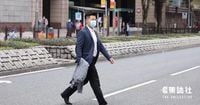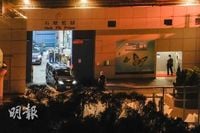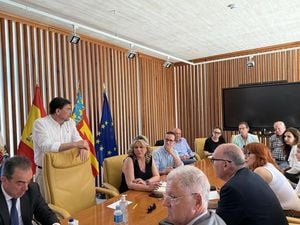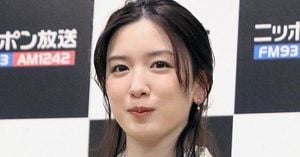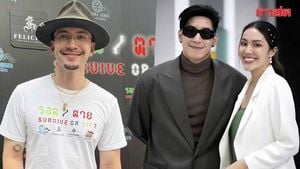On April 29, 2025, four pro-democracy figures in Hong Kong, Fan Kwok-wai, Mao Mengjing, Kwok Ka-ki, and Alvin Yeung, were released from prison after serving a sentence of four years and two months for conspiring to subvert state power. Their release marks a significant moment following their involvement in the 2020 Legislative Council primary election, during which 47 pro-democracy activists were charged with subversion, with 45 ultimately being convicted.
The four individuals were released from different correctional facilities early in the morning, with multiple seven-seater vehicles and private cars arriving at Shek Pik Prison, Lo Wu Correctional Institution, and Stanley Prison around 5 AM. By approximately 6 AM, they were transported back to their residences, shrouded in a low-key atmosphere. As they left the facilities, the windows of the vehicles were covered, obscuring the view inside.
Upon his return home, Fan Kwok-wai, also known as Gary Fan, expressed gratitude towards the people of Hong Kong and the media for their concern. He stated, "Thank you for your concern; I am returning home to reunite with my family." His arrival at his residence in Beverly Hills was met with warm embraces from two female relatives, highlighting the emotional significance of the moment.
Mao Mengjing, who returned to her home on Deep Water Bay Road, was greeted by her husband, Philip Bowring. He expressed his happiness at her return and thanked the public for their support, noting that she would take time to rest and readjust to life outside.
All four individuals were among the 47 defendants accused of conspiring to subvert state power between July 1, 2020, and January 7, 2021. The charges stem from their participation in the pro-democracy primary, which aimed to strategize for the Legislative Council elections. The judge in their case stated that dissolving the Legislative Council would significantly undermine the government's authority, creating a constitutional crisis in Hong Kong.
The legal framework under which they were charged is outlined in Article 23 of the Basic Law, which stipulates that those convicted of national security offenses are not eligible for a one-third sentence reduction unless deemed safe by the Correctional Services Department. This provision has raised concerns about the implications for civil liberties in Hong Kong.
Fan Kwok-wai, who has a background in art and politics, was previously a member of the Democratic Party and later founded the Neo Democrats. His political career began after he returned to Hong Kong from studying at the San Francisco Art Institute, where he was influenced by the 1989 Tiananmen Square protests. He became an assistant to a Legislative Council member and was active in promoting democratic reforms.
During his time in prison, Fan continued to engage in artistic pursuits, creating sketches and paintings. In a poignant letter to a friend in April 2021, he included a drawing of handprints pressed against glass, symbolizing the connection he felt with the outside world during his incarceration. He wrote about cherishing the brief moments of visitation from family and friends, stating, "These moments are opportunities to connect with the world outside the high iron windows."
Fan's legal representation emphasized his long-standing commitment to public service, having served over 21 years as a District Councilor and six years as a Legislative Council member. His barrister argued that he was not an organizer of the primary election but rather an active participant who believed his actions were lawful. The judge acknowledged Fan's ignorance of the law and his remorse, ultimately reducing his sentence by three months.
Mao Mengjing, like Fan, was heavily involved in the pro-democracy movement and faced similar charges. Her husband, Philip Bowring, expressed relief at her return and highlighted the need for her to adjust back to normal life, indicating the emotional toll these events have taken on their family.
Kwok Ka-ki and Alvin Yeung, who were also released, have been notable figures in the pro-democracy movement, advocating for reforms and greater political freedoms in Hong Kong. Their involvement in the primary election was part of a broader strategy to challenge the government's authority and push for democratic reforms.
The political climate in Hong Kong remains tense, with ongoing debates about civil liberties and the future of democracy in the region. The release of these four pro-democracy figures comes at a time when many are closely watching the government's actions and the implications for political dissent.
As the four individuals settle back into their lives, their experiences in prison and their commitment to the pro-democracy cause continue to resonate with many in Hong Kong and beyond. The case has sparked discussions about the balance between national security and individual rights, a topic that remains at the forefront of Hong Kong's political landscape.
In summary, the release of Fan Kwok-wai, Mao Mengjing, Kwok Ka-ki, and Alvin Yeung marks a significant moment in Hong Kong's ongoing struggle for democracy. Their journey reflects the challenges faced by those advocating for political reform in a climate of increasing repression. As they reunite with their families and communities, their stories serve as a reminder of the resilience of the pro-democracy movement in Hong Kong.
